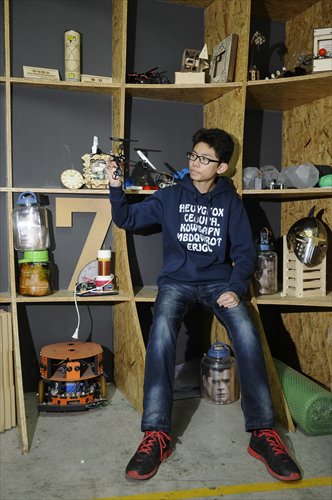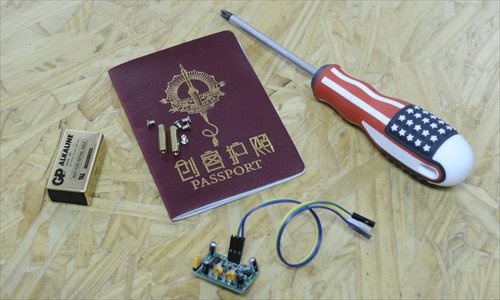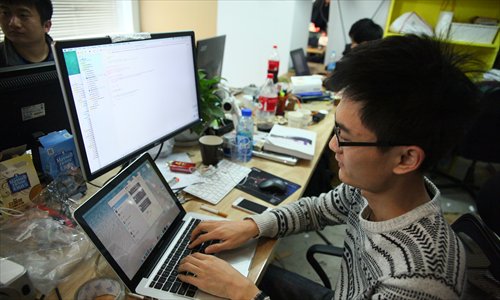The age of invention
China’s entrepreneurs are getting younger and younger, but are venture capitalists wise to invest?

Wang Yixiao, a 15-year-old middle school student who has recently launched a start-up company in Beijing. Photo: Li Hao/GT
Li Ailu likes to tell anyone who will listen that her son, a 14-year-old who was recently given 2 million yuan($325,256) in venture capital to develop a project of his own devising, was born to be an inventor.
"I remember a time when he was just one year old. He was crying his eyes out because he was sick and had to be put on an intravenous drip," recalls Li. "Then he saw a network socket, and he stopped crying."
In April, Li's son Wu Xingyun was awarded a Gold Medal at the 42nd International Exhibition of Inventions of Geneva for a computer simulation model that Wu is now developing into a system for "smart homes" - dwellings in which the electronic ecology of the home, from lighting to heating to the functioning of devices like smoke sensors and alarm systems, are connected through a communications network that can be controlled remotely.
Wu received the capital from an angel investor to found a start-up company shortly after the exhibition.
"The company [is developing] a comprehensive smart home system," said Wu in an interview with Sanlian Lifeweek Magazine.
The system, which utilizes "smart sockets" and "intelligent routers" developed by Wu, will make smart homes more automated, so that they will respond to changes in the inhabitant's preferences or routines without requiring manual input from the user.
"The system will be able to locate your position at any moment. When it detects that you are one kilometer from home, it will automatically turn on the air conditioner. If you return home earlier than usual for a number of days in a row, it will automatically change its settings accordingly," said Wu in the same interview. "The current systems on the market rely too much on manual control. At the moment, electronic appliances can only be controled with your phone. It's not user-friendly."

Tools that were given to young inventors at the event. Photo: Li Hao/GT

A young inventor at an event run by Beijing Makerspace. Photo: Courtesy of Beijing Makerspace
Prodigy and busy bee
Currently a third-year student at Beijing No.4 High School, Wu spends his recess and lunchtime hours hard at work programming, or responding to e-mails from investors and his start-up cohorts. Besides the time he devotes to completing his homework, his evening hours are spent in much the same way.
"Unlike most other students, he doesn't have any time to relax," said Li. "Almost every night, he will program until 11 pm or midnight."
Seeing the tremendous pressure that her son was under, Li tried to encourage Wu to slow down, but it only led the two to quarrel. Eventually, Li realized that this was the life that Wu wanted, and decided to support him in his endeavors.
"There are always sparks coming out of his brain," she said.
Wu is driven in part by what he perceives as the cutthroat nature of trying to do business in China.
Li said that when Wu first presented his inventions at the International Exhibition of Inventions of Geneva, smart home products were just starting to hit the market in China. But in the few months that have passed since then, the market has already become flooded with various smart home systems.
Another problem, said Wu in his interview with Sanlian Lifeweek Magazine was that copyright protections in China still left much to be desired. As soon as a new product hit the shelves, there would be imitation products within weeks, producing the same product at a lower price.
"It's like a swarm of locusts," said Wu.
The early bird catches the worm
While the venture capital given to Wu has attracted attention on account of his youth, Li Yan, a director at incubator space and cafe Cheku, said that budding young Chinese entrepreneurs were trying their hand at developing their own projects at an earlier age than ever before.
"As a result of the Internet, more and more teens are attempting to create their own projects," said Li Yan. "Typically, they're very strong in one area, such as hardware building or software programming, which they've developed by following their interests."
One such precocious young entrepreneur is 17-year-old Qi Linzhi, who like Wu, is a student at Beijing No.4 High School.
Qi is developing a smart phone app called Perspect, a navigational tool that allows users to plot their journey aided by a live view of the destination they seek to arrive at. The project received support from the Microsoft Ventures Accelerator program in Beijing this year, an initiative that gives first-time entrepreneurs mentoring, technical guidance, and opportunities for networking with other startups.
Qi decided to suspend his studies for the upcoming semester in order to focus his energies entirely on the project.
"I've spent a lot of time researching the project, and now it's time to turn it into a product that can be launched," said Qi in an interview with China Central Television (CCTV). "So I decided to quit my studies for a year to develop it."
Another teenager with hopes of making it big with his invention is 15-year-old Wang Yixiao, a student at the High School Affiliated to Renmin University of China's Chaoyang School.
"I want to build an online platform for the exchange of intellectual property, such as code," said Wang, who has founded a startup with two other budding entrepreneurs in their 20s.
Wang was reticent to reveal more about his project for confidentiality reasons, but said that his idea was born out of the need to resolve conflicts between open source and closed source code.
Li Yan said that young entrepreneurs had certain advantages that made them attractive to investors.
"Firstly, they have a more open mind, without being limited by ideas of what is and isn't possible in the way that adults are," said Li Yan. "Secondly, their ideas in some ways indicate future trends in the market, because they themselves will be the consumers of the future."
Li Yan noted that the China office of the International Data Group (IDG), a technology and venture capital conglomerate with its headquarters in the US, had set up a special fund for young entrepreneurs born after 1990 this August.
Two sides of the coin
Some other industry insiders however are less optimistic about the prospects of investing in adolescent inventors and entrepreneurs.
"From a market standpoint, projects like Wu's, Wang's and Qi's haven't yet achieved any success," said Xiao Wenpeng, co-founder of Beijing Makerspace, a technology lab and incubator space. "The investment [that Wu] has received is not especially large and their projects are not particularly original."
Xiao also said he thought teenage entrepreneurs' lack of experience would hurt them.
"Having former business connections is very important for startups," said Xiao. "Also, the conditions for entrepreneurship in China are not very good at the moment. Even for those who have a good idea, a wealth of experience and a lot of connections, the success rate for startups is below 10 percent."
Xiao did acknowledge however, that investment in adolescent inventors could reap rewards in the long term, even if they failed to make a return on their initial investment.
"If [an investor] doesn't care whether their initial investment pays off, and they believe in the teen's potential, then it can be worthwhile," said Xiao. "Then if the teenager succeeds in his or her second start-up venture as he or she enters the 20s, which is the golden age for entrepreneurship, the investor will probably have the opportunity to profit."
An investment manager surnamed Zhuang at a venture capital company in China, was also skeptical about investors being able to quickly profit from adolescent entrepreneurs.
"Trying to profit from these kids too early is like trying to make rice shoots grow by pulling them out of the ground," said Zhuang.
Li Yan said that young entrepreneurs would be best served by partnering with large investment companies rather than small investors.
"Large investment companies will not push them so hard to make a profit immediately," said Li Yan. "They will see the projects as a long-term commitment and a way to build a relationship with a young entrepreneur."
Wang said that age had nothing to do with whether a project would be successful or not.
"Investors should not judge us by our age but by our thinking, our insight, our decision-making abilities and our skills," said Wang. "Many young inventors are more mature and more creative than their peers of the same age."
Planting the seed
Qu Tian, the angel investor who is supporting Wu, said that he only decided to give Wu the capital after meeting him and being impressed by his maturity, despite his tender age.
"I hope this amount of money will provide an economic security for Wu's research. Perhaps this project will not succeed in five or 10 years, but I think he will finally achieve something," said Qu in an interview with Sanlian Lifeweek Magazine.
Speaking about her son Wu, Li Ailu said that he was simply embracing the present.
"Although a lot of people are not optimistic about his future and think that he's too young to be put in a position of such responsibility, we think it's the right time for him to transform his idea into reality and to realize its value [on the market]," she said.